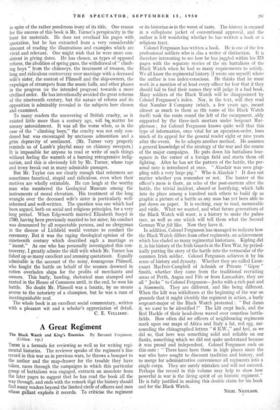A Great Regiment
The Black Watch and King's Enemies. By Bernard Fergusson. (Collins. 15s.)
THERE is a formula for reviewing as well as for writing regi- mental histories. The reviewer speaks of the regiment's fine record in this war as in previous wars, he throws a bouquet to the author and the map-drawer for the trouble they have taken, races through the campaigns in which this particular group of battalions was engaged, extracts an anecdote from the later pages to suggest that he has rea4 the book all the way through, and ends with the remark that the history should find many readers beyond the limited circle of officers and men whose gallant exploits it records. To criticise the regiment or its historian-is-in the worst of taste. The history is encased in a cellophane jacket of conventional approval, and the author is left wondering whether he has written a book or a religious tract.
Colonel Fergusson has written a book. He is one of the few professional soldiers whr is also a writer of distinction. It is therefore interesting to see how he has juggled within his 375 pages with the separate stories of the six battalions of the Black Watch when he had so many requirements to satisfy. We all know the regimental history (I wrote one myself) where the author is too index-conscious. He thinks that he must work in a mention of at least every officer for fear that if they should fail to find their names they will judge it a bad book. Many soldiers of the Black Watch will be disappointed by Colonel Fergusson's index. Nor, in the text, will they read that Number 3 Company (which, a few years ago, meant almost as much to them as the name of the Black Watch itself) took the route round the left of the escarpment, ably supported by the three-inch mortars under Sergeant Mac- pherson; for Colonel Fergusson knows quite well that this type of information, once vital for an operation-order, loses much of its appeal for the general reader eight or nine years after the event. So he adopts another method. He assumes a general knowledge of the strategy of the war and the course of the major campaigns. He puts down his battalions four- square in the corner of a foreign field and starts them off fighting. After he has set the pattern of the battle, the per- sonal note is introduced at once. " Alasdair was seen grap- pling with a very large pig." Who is Alasdair ? It does not matter whether you remember or not. The banter of the officer's mess is there, an echo of the post-mortem after the battle, the trivial incident, absurd or horrifying, which falls into its place among a hundred such others to build tip as graphic a picture of a battle as any man has yet been able to put down on paper. It is exciting, easy to read, memorable and virile. What we wanted, and what future generations of the Black Watch will want, is a history to make the pulses race, as well as one which will tell them what the Second German War felt like. Now they have it. In addition, Colonel Fergusson has managed to indicate how the Black Watch differs from other regiments, an achievement which has eluded so many regimental historians. Kipling did it, in his history of the Irish Guards in the First War, by period- ically putting the story of the battle into the vernacular of the common Irish soldier. Colonel Fergusson achieves it by his sense of history and dynasty. Whether they are called Lieut- enant MacIver-Campbell of Achnish or Private " Gipsy " Smith, whether they came from the traditional recruiting areas of Perth, Angus and Fife or from Lancashire, they are all " Jocks "to Colonel Fergusson—Jocks with a rich past and a Stammsitz. They are different, and like being different. When the kilt was withdrawn at the beginning of the war on grounds that it might identify the regiment in action, a burly sergeant-major of the Black Watch protested : "But damn it, we want to be identified I" The kilt crept back, and the Red Hackle of their head-dress waved over countless battle- fields. How often did we officers of neighbouring regiments mark upon our maps of Africa and Italy a fat, red egg, sur- rounding the chinagraphed letters "6 B.W.," and feel, as we did so, that here was something solid and reliable on our flanks, something which we did not quite understand because it was proud and independent. Colonel Fergusson ends on this note : "There have been those in high places since the war who have sought to discount tradition and history, and to merge for administrative convenience all regiments into a single corps. They are surely mistaken and will not succeed. Perhaps the record in this volume may help to show how powerful in war is the living spirit of an historic regiment." He is fully justified in making this double claim for his book and for the Black Watch.
NIGEL NICOLSON.






















 Previous page
Previous page